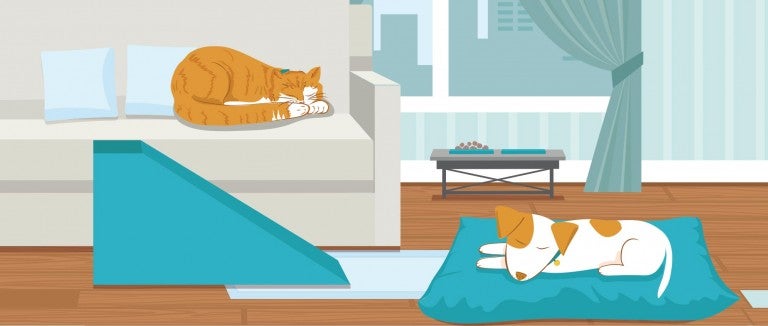It happens so fast: One day we’re adopting a young, energetic dog or cat, and then we blink and the veterinarian is telling us we’ve got a senior pet on our hands. If your companion animal is slowing down, don’t worry: Caring for an elderly dog or cat just requires a little more thoughtfulness. Specifically, you’re looking for ways to make your senior pet’s life safer, easier and more comfortable.
Make the home safe for your elderly pet
The home environment is particularly important for geriatric pets, whose health tends to go downhill at a slow, steady pace. Changes to their living space can greatly affect their quality of life during their remaining months or years.
Spend a little time observing your senior pet to see where they need help. Consider where your pet likes to sleep or perch, the activities they enjoy and the pathways they use around your home, then think of modifications that will help them maintain their routine. Does your elderly cat struggle jumping up onto their cat tree? Is your senior dog avoiding walking on the hardwood floors because they can’t get traction?
Here are some safety modifications for senior pets:
- Use nonslip carpet runners to provide stability on hardwood, tile and linoleum floors. Add them to the space around your pet’s bed, at the base of stairs, on the stairs themselves and/or leading up to their food.
- Runners should be visually consistent and have a vibrant pattern to help vision-impaired pets identify safe spaces.
- For help navigating spaces outside the home (like your vet’s office), look for commercial pet products designed to give paws some added traction, such as paw grips.
- Restrict access to potential problem spots in the house. As pets age, their mental and physical faculties decline, which can lead to trouble even in areas they once navigated with ease.
- Use baby gates to block stairs.
- Check your backyard for danger zones, making sure swimming pools, fire pits and window wells are covered.
Even if your pet still seems spry for their age, consider making home modifications sooner rather than later—change is more stressful for older animals.
Give geriatric pets easy access to the necessities
When caring for an elderly cat or dog, make sure they have easy access to the essentials: food and water bowls, litter boxes and pet beds.
Keep the following tips in mind:
- Use food and water bowls with nonslip bottoms.
- Make sure litter boxes have ramps or low sides.
- Try keeping all the essentials in one place so your senior pet doesn’t have to get too far to reach food, water, the litter box, favorite toys, etc.
- Use ramps to provide access to spots that might otherwise require climbing stairs or jumping up (e.g., the backyard, the car, a favorite napping spot).
- Cover the ramp with carpet or another nonslip material, and add rails or other physical barriers, if needed, to prevent falls.
In general, try to modify your home environment so your pet can keep to their normal routine rather than making massive changes. This will provide consistency and comfort.
Sign up to receive our exclusive e-book full of important information about keeping your cat healthy and happy.

Keep senior pets comfortable
Geriatric pets have many of the same health concerns as geriatric people: arthritis, reduced motor and cognitive skills, balance problems, hearing loss and vision impairment. They might also experience muscle and weight loss, social withdrawal, an unkempt coat, confusion, fatigue and sunken facial features.
It could seem counterintuitive, but keeping elderly pets moving helps loosen stiff joints and reduces the risk of pressure sores. Mobility is also key to animals’ emotional health, helping them enjoy their routines as long as possible.
Here are a few more ways to help keep elderly cats and dogs comfortable:
- Ensure they have comfortable beds that are easy to get in and out of. Softer beds help prevent pressure sores.
- Designate sanctuary spaces where your pet can escape the activity in your home. Place beds against a wall, furniture or in a corner to help them feel safe.
- Keep the space at a comfortable temperature; older pets are more sensitive to temperature extremes.
Don’t forget yourself
As the guardian of an elderly pet, be sure to take care of yourself too!
Make things easier by keeping on top of your senior pet’s health challenges and consulting your veterinarian for any emergent issues. If your pet requires multiple medications (or even just one!), use a tracking chart and/or pill organizer to avoid missed doses.
And remember, the senior years are special. Take inspiration from your pets as they slow down: Nap with your kitty in the sun, enjoy more leisurely (i.e., slower!) walks and relish the opportunity to stop and smell the flowers with your pup.
